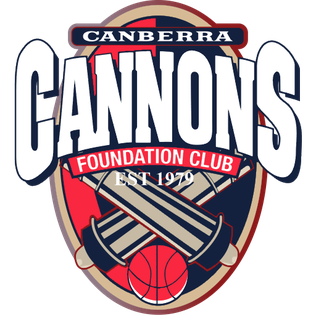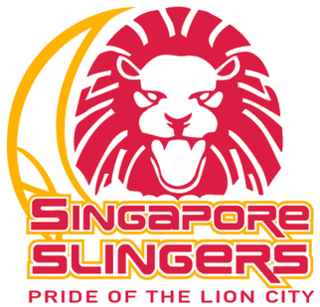Related Research Articles

The National Basketball League (NBL) is a men's professional basketball league in Australasia, currently composed of ten teams: nine in Australia and one in New Zealand. It is the premier professional men's basketball league in Australia and New Zealand.

The Canberra Cannons are a defunct basketball team that competed in Australia's National Basketball League (NBL). They went into financial administration in 2003 and were relocated to Newcastle, where they became the Hunter Pirates. After this venture also folded the team was relocated to Singapore and played as the Singapore Slingers for the 2006/07 season.

The Brisbane Bullets are an Australian professional men's basketball team in the National Basketball League (NBL) based in Brisbane, Queensland. They competed from 1979 to 2008, and returned to the league in 2016. Brisbane were one of ten NBL foundation teams and have won three NBL championships, being successful in the 1985 and 1987 seasons, and again in 2007. They have also competed in the 1984, 1986 and 1990 grand finals and have reached the playoffs 22 times.
Robert Paul Rose is an American-Australian retired professional basketball player. He played the majority of his career in the Australian National Basketball League (NBL), where he won a championship with the South East Melbourne Magic in 1992 and was a two-time NBL Most Valuable Player in 1993 and 2001. Rose was nicknamed "Australia's Michael Jordan" due to his clutch shooting and defensive abilities.

The Adelaide 36ers are an Australian professional men's basketball team in the National Basketball League (NBL). The 36ers are the only team in the league representing the state of South Australia and are based in the state's capital of Adelaide. The club was originally called the Adelaide City Eagles when they joined the NBL in 1982, but changed their name to the 36ers the following year. The 36ers nickname comes from the fact that the Colony of South Australia was officially proclaimed on 28 December 1836. Since 2019, the 36ers play their home games at the Adelaide Entertainment Centre.

Mark Davis is an American-Australian former professional basketball player. He most notably played in the National Basketball League for the Adelaide 36ers between 1985 and 2001, gaining the nickname of "The Chairman of the Boards" for his record-breaking rebounding achievements.
Mark Robert Bradtke is an Australian retired professional basketball player who played mainly in Australia's National Basketball League, but also had a single stint in the National Basketball Association (NBA) with the Philadelphia 76ers in 1996–97. As well as his outstanding play, Bradtke was known in the early part of his NBL career for his mullet haircut.
Jacob Holmes is an Australian former professional basketball player who played 14 seasons in the National Basketball League (NBL).
Brett Steven Maher is an Australian retired professional basketball player. He played his entire seventeen-year career for his hometown Adelaide 36ers in the National Basketball League (NBL) from 1992 to 2009. Maher also represented Australia at the 1996, 2000 and 2004 Summer Olympic Games, as well as at the 1998 FIBA World Championship.

The Singapore Slingers are a Singaporean professional basketball team that last competed in the ASEAN Basketball League. The Slingers were known as the JobStreet.com Singapore Slingers between 2009 and 2014, due to sponsorship ties with JobStreet.com.
Dean Scott Brogan is a former professional Australian rules footballer who played for the Port Adelaide Football Club and Greater Western Sydney Giants in the Australian Football League (AFL). He is currently serving as the Giants' ruck and stoppages coach.

Brett Wheeler is a former professional basketball player in the National Basketball League. A 6'10" (208 cm) tall Centre or Power forward, Wheeler played for the Adelaide 36ers, South East Melbourne Magic, Victoria Titans, Perth Wildcats and the Sydney Kings during his 17 year career, appearing in a record 8 NBL Grand Finals and won the 2003–04 and 2004–05 NBL championship with the Kings. He also represented Australia at international level during his career.
Calvin Thomas Bruton, is an American-born Australian former professional basketball player and coach. He has been an integral part of the National Basketball League (NBL) since its inception. Bruton won an NBL championship with the Brisbane Bullets in 1985, was a two-time member of the All-NBL First Team while playing for the Geelong Supercats and was named NBL Coach of the Year while he was a player-coach for the Supercats in 1982. He also won a second NBL championship while coaching the Perth Wildcats in 1990. As a result, Bruton became one of the first inductees into the NBL Hall of Fame when it opened in 1998.
Leroy Loggins is an Australian-American former professional basketball player who played in the National Basketball League (NBL) from 1981 until 2001.
Martin Clarke is an Australian former professional basketball player and coach. He is the former head coach of the National Basketball League's Adelaide 36ers and was an assistant coach of the Australian Boomers at the 2012 London Olympics. In 2018, Clarke was hired as the director of the NBA Global Academy at the Basketball Australia Centre of Excellence in Canberra.
Paul Rees is a former Australian professional basketball player who played his entire career in the Australian National Basketball League. Rees was known for his presence under the basket and while not blessed with a great jumping ability he was able to use his physical size to his advantage and was considered to be a strong rebounder.
Michael George McKay is an Australian former professional basketball player. He played most of his career with the Adelaide 36ers of the National Basketball League (NBL), winning the 1986 championship with the team. McKay also played in the NBL for the West Adelaide Bearcats, Brisbane Bullets, Canberra Cannons and the Wollongong Hawks. He was a frequent member of the Australia men's national basketball team during the late 1980s and early 1990s, including being part of the national team at the 1992 Summer Olympics in Barcelona.
Darryl "The Iceman" Pearce is an Australian former professional basketball player. He played in Australia's National Basketball League (NBL) for the Adelaide 36ers from 1982 to 1991 before playing four seasons (1992–1995) with the North Melbourne Giants. A 6'3" (191 cm) Shooting guard, Pearce is regarded as one of the best ever Three-point field goal shooters in NBL history having shot at 41.9% from beyond the arc during his 374-game career.
William Lawrence Jones is an American former professional basketball player. He played the majority of his professional career in Australia's National Basketball League (NBL) from 1985 until 1992.
Scott Ninnis is an Australian professional basketball coach and former player. He won three National Basketball League (NBL) championships during his career: 1986 and 1998 with the Adelaide 36ers and 1992 with the South East Melbourne Magic. He coached the 36ers for two years and was an assistant coach with the club when they won the 1998–99 and 2001–02 NBL championships. He returned to the 36ers' coaching staff in 2023 as an assistant and was appointed as interim head coach midway through the 2023–24 season. Despite re-signing with the 36ers to be head coach, he was sacked in August 2024.
References
- ↑ "Philip SMYTH".
- ↑ "Phil Smyth". Aussie Hoopla. Retrieved 7 November 2024.
- ↑ Back in the Day: Late Autumn 1984. Basketball Australia News (18 May 2010). Retrieved 2012-09-02.
- ↑ HighBeam [ dead link ]
- ↑ "SMYTH, Philip John, AM". It's an Honour. Retrieved 22 December 2013.
- ↑ "Phil Smyth". Sport Australia Hall of Fame. Retrieved 25 September 2020.
- ↑ "Smith, Phillip: Australian Sports Medal". It's an Honour. Retrieved 22 December 2013.